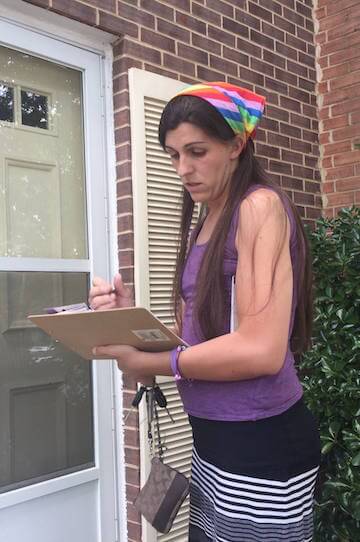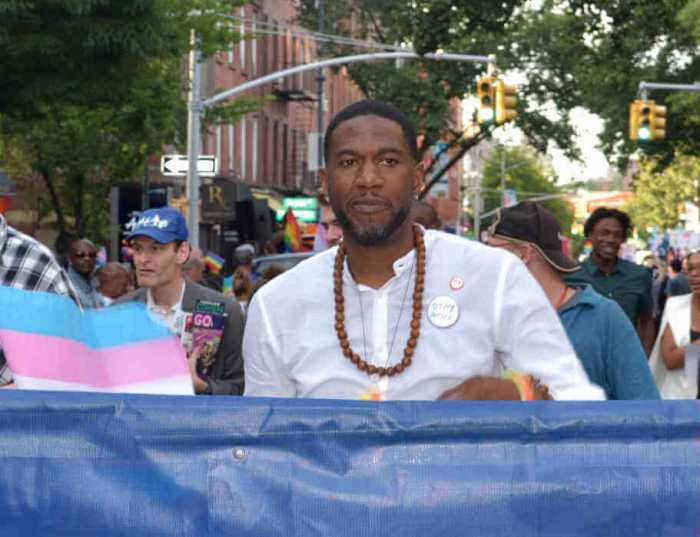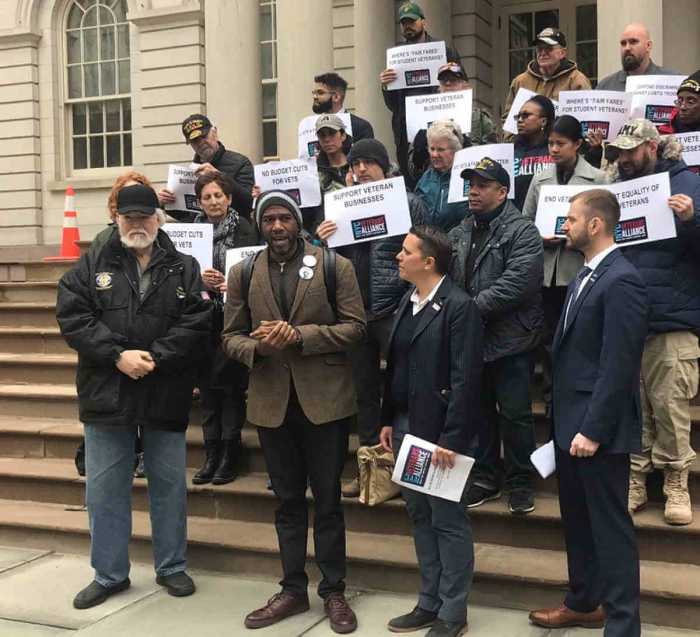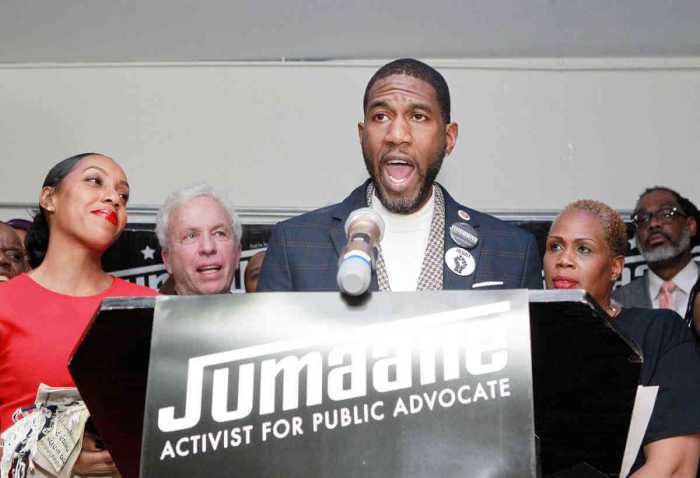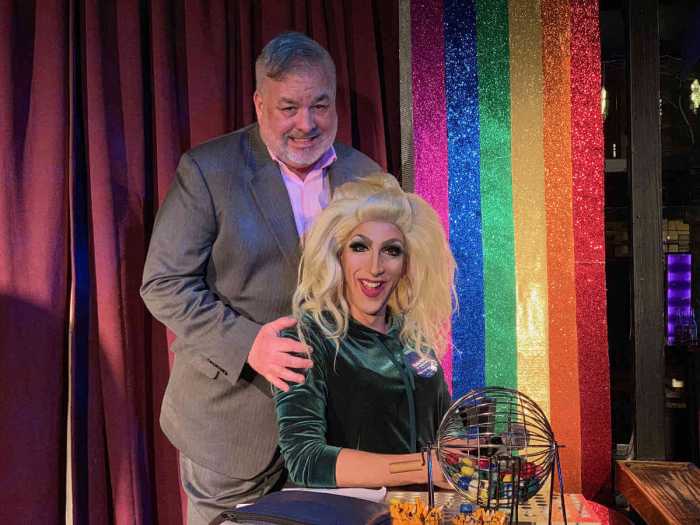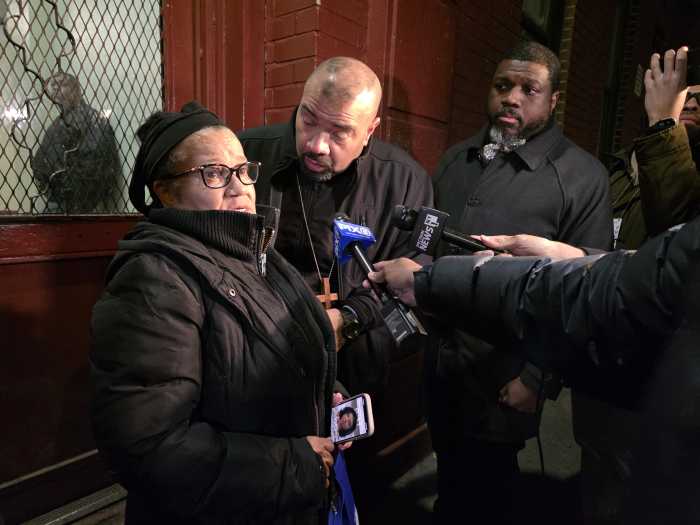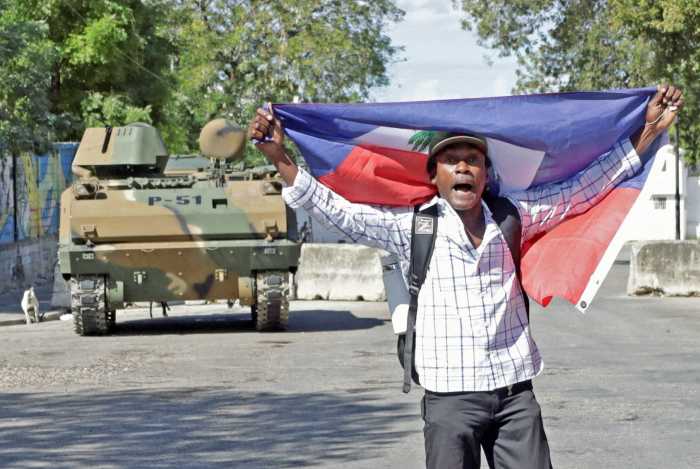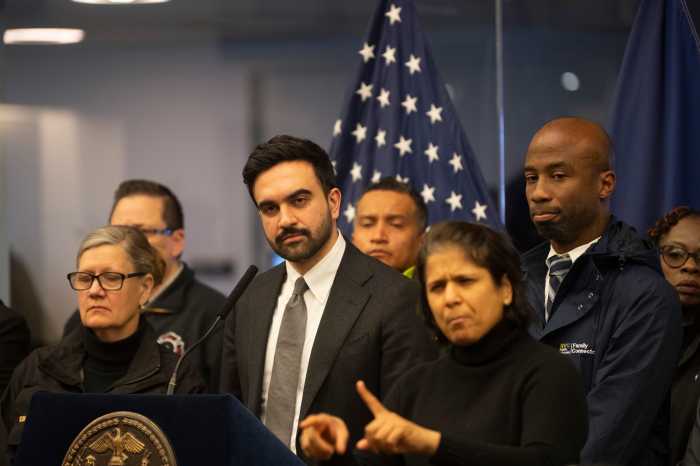Mayor Bill de Blasio, reelected this week to a second term, in June’s Pride March in Brooklyn. | PAUL MARTINKA
On an off-year election night, a wave of revulsion at the radical and chaotic presidency of Donald Trump meant big wins for Democrats and the election of LGBTQ candidates — including eight who are transgender — and their allies in local races nationwide.
In New York City, Mayor Bill de Blasio, who bested out lesbian Christine Quinn for the queer vote in the 2013 Democratic primary, easily overcame a challenge from Staten Island Republican State Assemblymember Nicole Malliotakis. According to unofficial results from the city Board of Elections, the mayor captured more than 66 percent of the vote, with the GOP candidate garnering less than 28 percent. (Bo Dietl, an inflammatory law and order candidate who participated on the public debate stage with the two leading contenders, finished with less than one percent of the vote, trailing a little known out gay independent, Michael Tolkin.)
In 2011, during her first term in the Assembly, Malliotakis voted against marriage equality, when it was enacted into law, a vote she has since recanted. In an astonishing interview with Gay City News and its sister publications earlier this year, however, the Republican explained her continued opposition to the Gender Expression Non-Discrimination Act, a transgender civil rights measure, by saying, “If a man were to follow someone into a restroom… they’re there because they want to commit a crime against a woman and they are caught, they can use that law as a loophole. I believe there is a loophole in the law that allows it to be exploited for individuals… to commit a type of sex crime.”
Transphobe loses big in New York City; Dems win Virginia, New Jersey governor’s races
Elsewhere in the city, incumbents largely were returned to office, though Manhattan District Attorney Cyrus Vance, Jr., running unopposed, faced a surprisingly strong, last minute write-in challenge from Marc Fliedner, an out gay ex-prosecutor prompted to jump in when revelations surfaced about the incumbent’s failure to pursue fraud charges against Ivanka and Donald Trump, Jr., in their marketing of the Trump Soho and sexual assault charges against Harvey Weinstein brought by an Italian model who captured a partial admission from the former film mogul on tape. The write-in tally in the DA’s race was nearly 10 percent of the total, highly unusual in any elective contest.
Governor-elect Ralph Northam of Virginia. | FACEBOOK.COM/RALPH.NORTHAM
The evening’s big news came from Virginia, where Democratic Lieutenant Governor Ralph Northam easily dispatched Ed Gillespie, a former Republican National Committee chair who abandoned his establishment style to go full-Trumper with ads about immigrant gangs, sanctuary cities, and even pedophilia. Still, Gillespie held off on bringing the president into Virginia, leading former White House senior advisor Steve Bannon to brag to the New York Times that a purported GOP surge in the polls there proved that “Trumpism without Trump can show the way forward.”
Instead, it proved to be a right-wing delusion. And though the president frequently voiced his support for Gillespie and made 11th hour robo-calls on his behalf, when the news of Northam’s big win emerged, Trump, halfway around the world in Asia, quickly distanced himself from the loser, tweeting, “Ed Gillespie worked hard but did not embrace me or what I stand for.”
The Democratic wave in Virginia also swept away a huge GOP advantage in the House of Delegates, the lower house of the General Assembly, where Republicans held 66 of 100 seats. Based on preliminary results, there is now a 50-50 split, though a number of races, including one with an apparent Democratic victor, could be subject to recounts. In the Virginia Senate, Republicans hold a 21-19 edge, but seats in that chamber were not up for election.
The Democratic House of Delegates sweep brought the state’s first out transgender legislator, Danica Roem, into office, when she beat incumbent Bob Marshall, an anti-LGBTQ Republican who has pushed a “bathroom bill.” Marshall, trying to hold onto his seat representing Prince William County, southwest of Washington, repeatedly referred to Roem with male pronouns. Virginia also elected its first out lesbian to the General Assembly, Dr. Dawn Adams, who will represent the Richmond area.
Elsewhere, Andrea Jenkins became the first African-American transgender woman elected to office, winning a seat on the Minneapolis City Council, as did trans man Phillipe Cunningham. In Erie, Pennsylvania, voters chose Tyler Titus, a transgender man, for the School Board, a post won by trans woman Gerri Cannon in Somersworth, New Hampshire, while Raven Matherne, a transgender woman, was elected to the Stamford, Connecticut Board of Representatives, Stephe Koontz, a trans woman, was elected to Doraville, Georgia’s City Council and Lisa Middleton, also transgender, was elected to the Palm Springs City Council in California. Seattle elected Jenny Durkan as its first lesbian mayor — and the only woman in that post since the 1920s.
Danica Roem became the first out transgender candidate elected to the Virginia House of Delegates. | FACEBOOK.COM/DANICAFORDELEGATE
In the Delaware River town of Milford, Pennsylvania, Sean Strub, the founder of POZ magazine and an early LGBTQ marketing innovator, was elected mayor. Strub has in recent years steered significant economic development projects in Milford, including revitalizing the historic Hotel Fauchere, that have restored the town’s position as a weekend getaway locale.
The results in the New Jersey governor’s race were never in doubt. There, Democrat Phil Murphy, a former Goldman Sachs executive who served as President Barack Obama’s ambassador to Germany for four years, trounced Republican Lieutenant Governor Kim Guadagno, by 13 percentage points. Guadagno battled unsuccessfully to escape the taint of Governor Chris Christie, wildly unpopular in the wake of the Bridgegate scandal that came to light after his 2013 reelection and his obsequious devotion to Trump once the president’s nomination became clear last year.
In New York, the next big question is Melissa Mark-Viverito’s successor as City Council speaker. Among those running are three gay incumbents — Chelsea’s Corey Johnson, Majority Leaader Jimmy Van Bramer of Queens, and Ritchie Torres, a Latino black man and the Bronx’s first out LGBTQ elected official. Other contenders are the Upper West Side’s Mark Levine, Upper Manhattan’s Ydanis Rodriguez, a Dominican immigrant, Donovan Richards, Jr., an African American from Queens, Brooklynite Robert E. Cornegy, Jr., who co-chairs the Council’s Black, Latino and Asian Caucus, and Jumaane Williams, who represents a large Caribbean constituency in Brooklyn. Williams, in a recent interview with Gay City News, sought to put to rest concerns among progressives about his support for marriage equality and a woman’s right to choose. Rodriguez angered progressives this year by supporting longtime LGBTQ foe Ruben Diaz, Sr.’s run for the City Council.
After two consecutive female speakers, no woman appears to be in contention. Julissa Ferreras-Copeland, a Queens councilmember thought to be a strong candidate, surprised everyone when she announced earlier this year she would not seek reelection.

